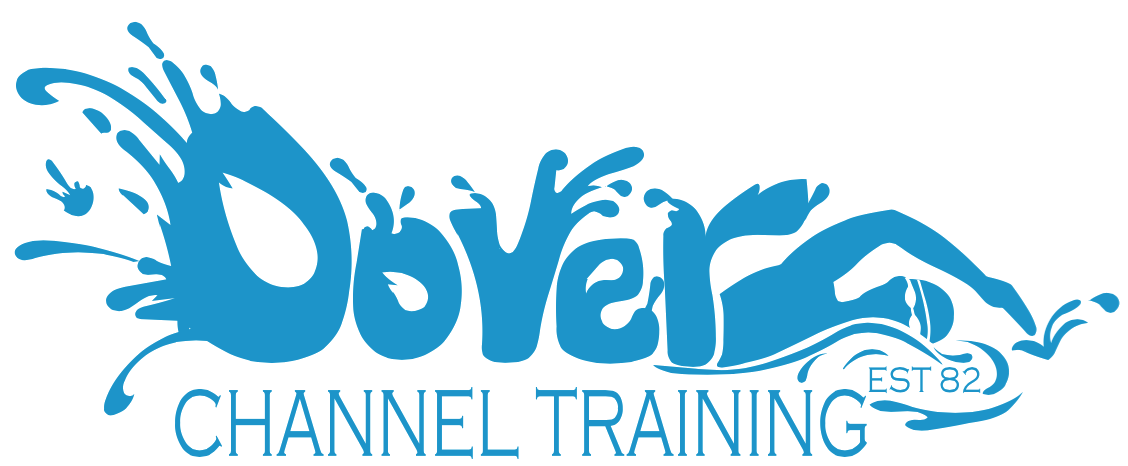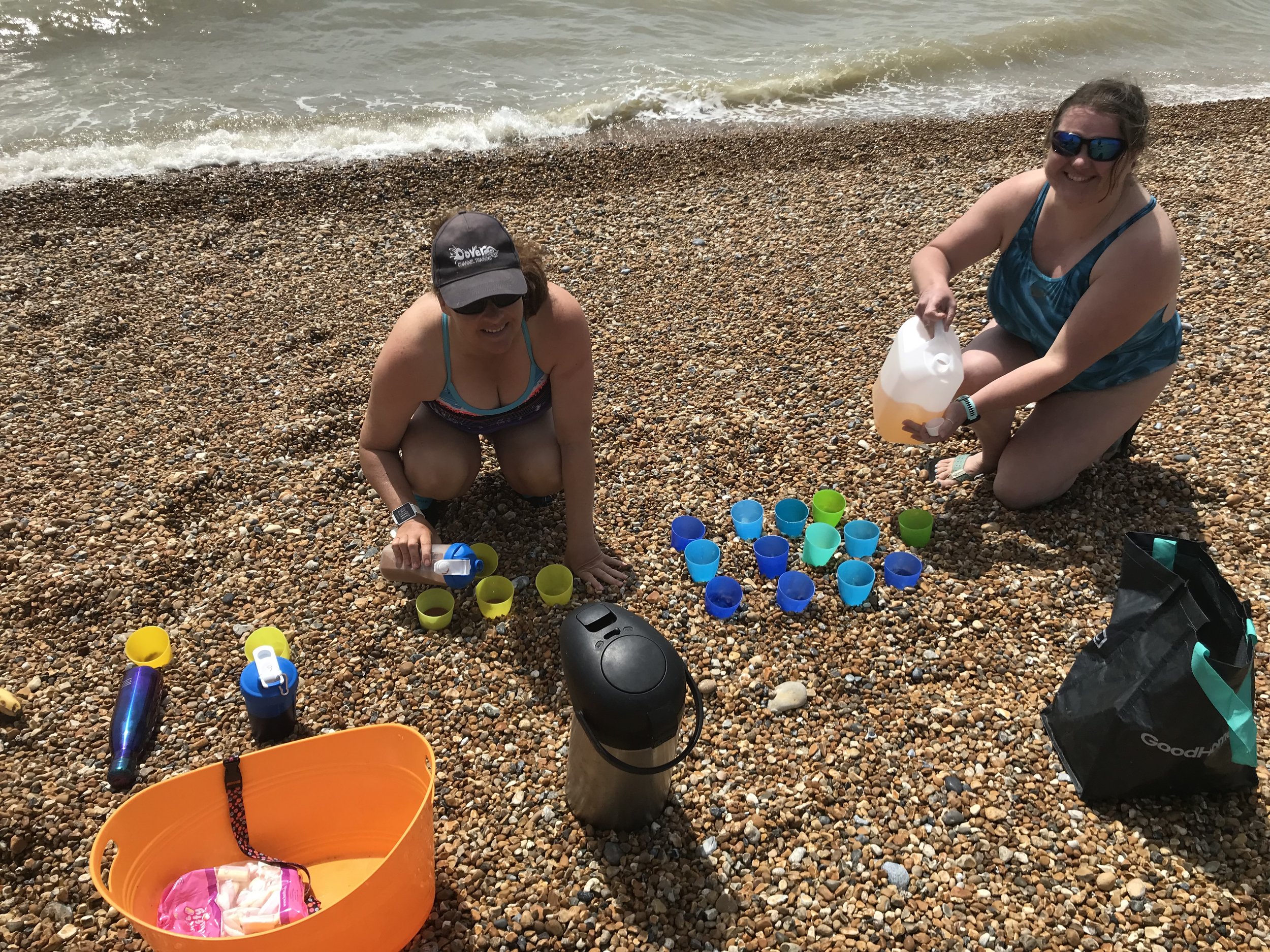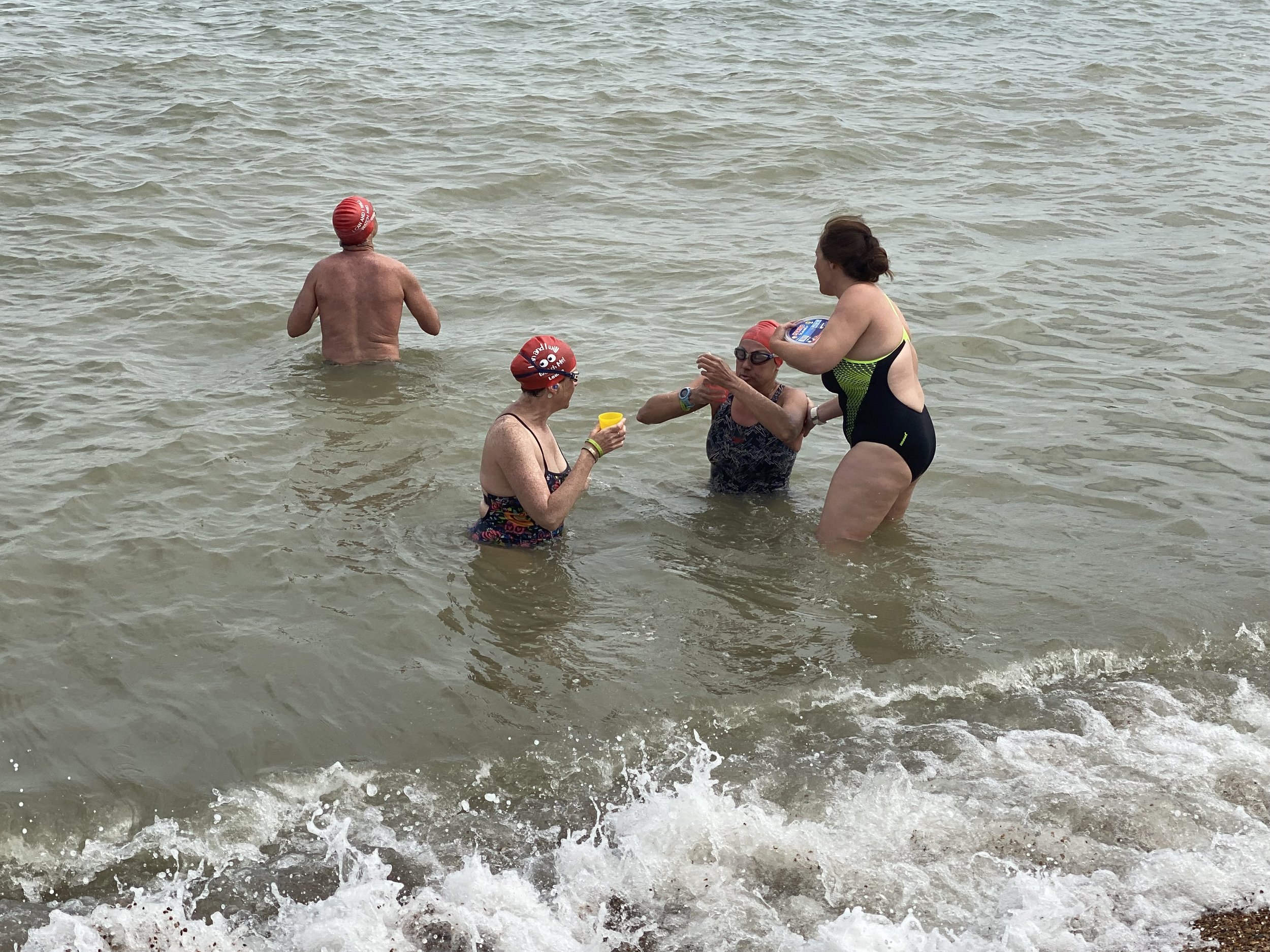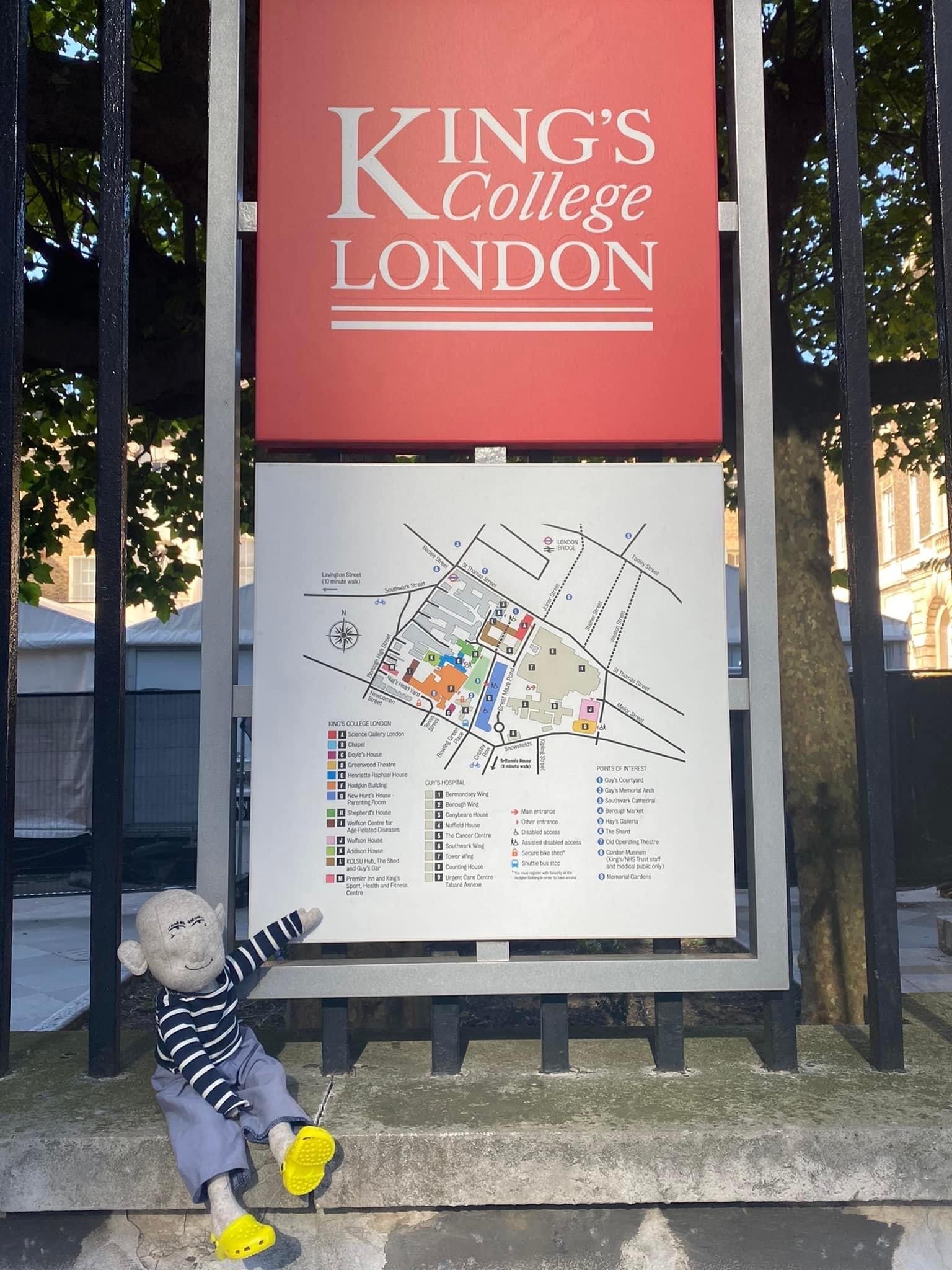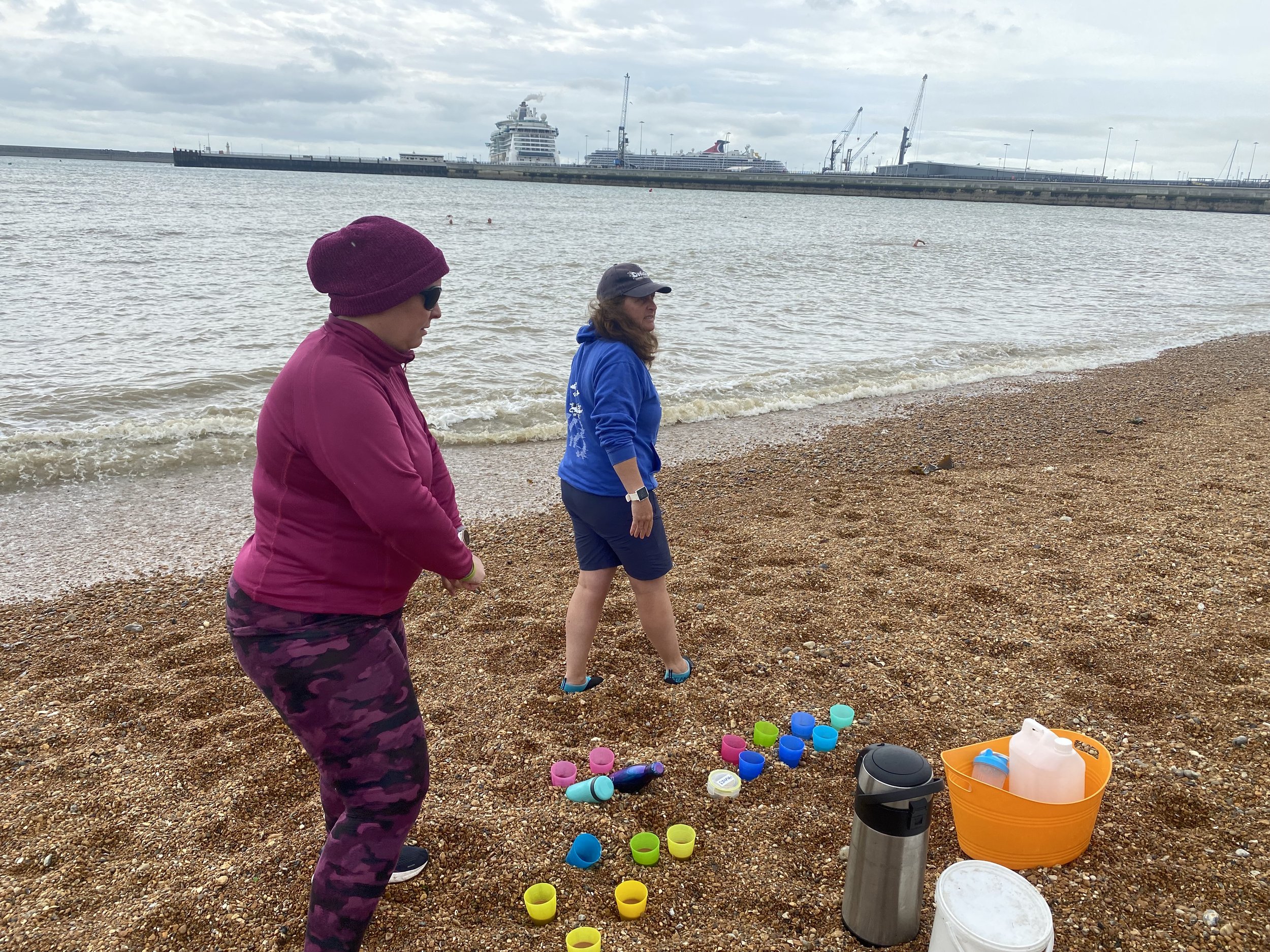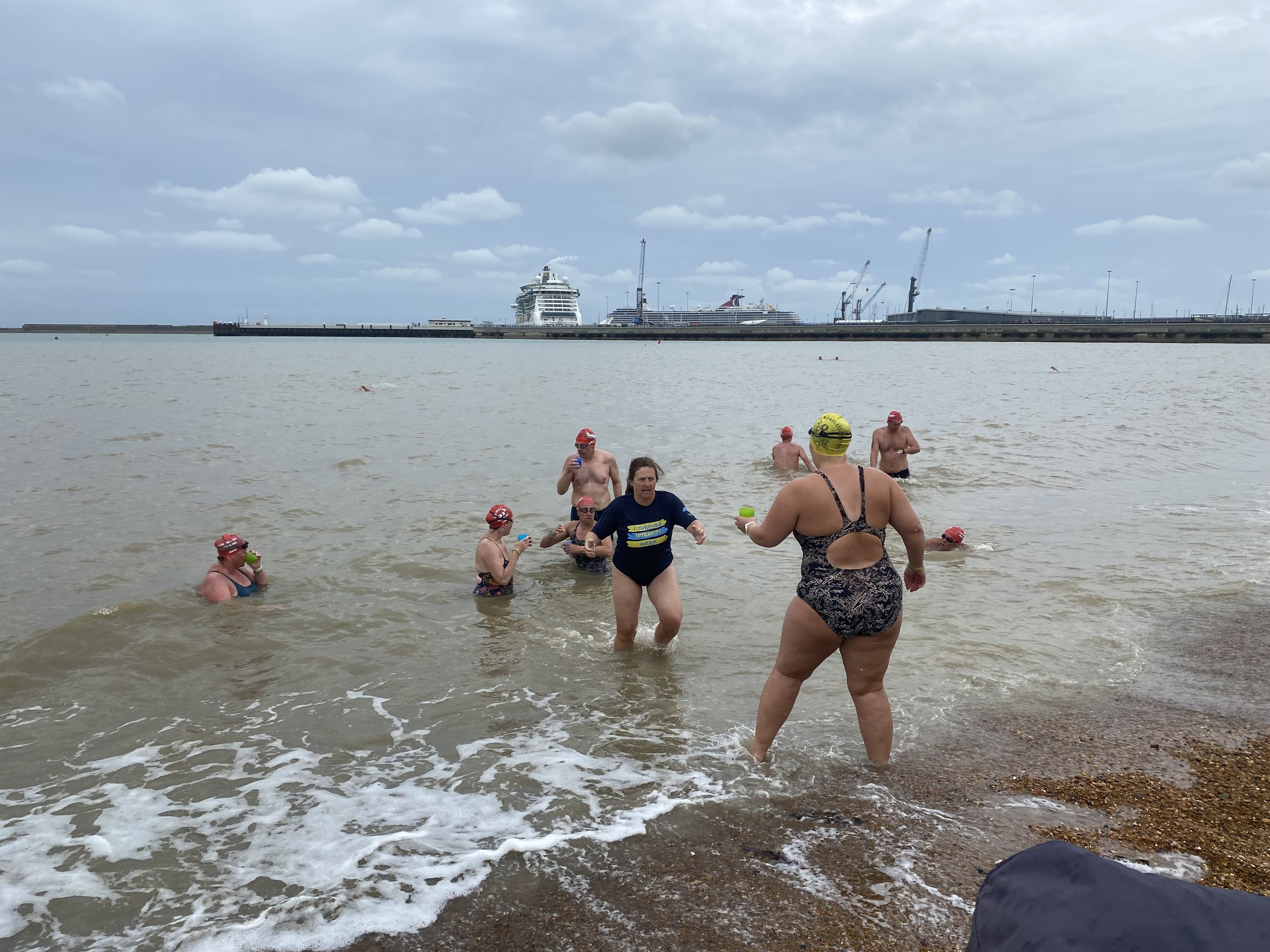Week 8 - You + Me = We
Weekly Review
NB Please scroll to the bottom for a selection of the photos taken
On Tour
Once a month we go ‘On Tour’. It’s a great opportunity to experience different conditions, often those that are more realistic when thinking about the big day.
We decided to bring this in this year after reflecting on the year when we were forced to find a different training venue every Saturday due to the construction of the new marina in Dover. That year the swimmers seemed just a little more prepared for whatever the channel threw at them. Moving every weekend was hard work for everyone, so we decided to make it once a month instead.
This month we were to swim in Hythe. Hythe is like a town where time stood still. It’s a beautiful location. When we arrived it was so calm that you could see the reflections of the paddle boarders. What an enticing sight. However, it wasn’t to last. As the tide came in the wind came up and lead to some swell & choppy water. We didn’t have the big waves that we lovingly remember from that year, but the conditions were challenging nonetheless.
We gave a location specific safety briefing which inlcuded to stay in close. Anita definitely wins the prize on that one - she was so close at times that a moderate wave would have placed her carefully on the beach. Stuart came a close second!
Also worthy of note was Philip managing to do a pirouette in a wave, fall over and not spill a drop of feed!! Impressive skills!
Talking of ‘interesting’ conditions, whilst we were having fun in Hythe, some DCTers and DCT alumni were battling the BLDSA Champion of Champions event. Well done to everyone who entered and competed. It was definitely a tough day in the office on that event.
It was back to our beloved Dover Harbour on Sunday. I walked out of the hotel in shorts and t-shirt and quickly realised that the super hot heat wave was over and quickly put on another layer!
It was the same weather pattern as we saw in Hythe - relatively calm at low water and increasingly choppy as the tide came in. Ordinarily, the more challenging conditions are by the ferry wall as the prevailing wind direction is SW, but on this occasion the wind was NE and so it was the beach area that was most challenging and the ferry wall was nice and calm.
It was lovely to see the 2022 SwimTayka swimmers back with us for more training.
What I loved most about this weekend is the support that I’ve witnessed between swimmers. We had the chuckle brothers (you know who you are), swimmers working together for lifts and shared transport. People buddy swimming to help each other and checking in on new swimmers who stopped. We had so many swimmers & partners helping at feeds. We had the flash mob celebrations for the big swims.
One of the fascinating things about running a group where there is a mix of new people for a season and returning swimmers is the ever changing group dynamics. Some characters are obvious from the start, some start to emerge as confidence grows.
Over the last few weeks some of the class of 2022 characters have started to emerge and this weekend what I saw was simply wonderful. I suspect that there will be some moments that some swimmers will remember for years to come. It took a successful swim before i realised that it was, in fact, the journey to success that I held most dear and not the moment I stepped out onto French soil.
We take training seriously, but that doesn’t mean that we have to be serious. I love hearing the banter and the laughter. From my own experience, a simple comment or joke can lift me for an entire hour. So it’s more than a bit of fun, it support it is best form.
This is also good training for the big day. If you think about it, you’re also learning what’s important for you to swim well, which is useful for your crew to know. You’re also learning how to crew for others.
Keep being amazing. Keep supporting each other. Keep trusting the process.
If you’d consider leaving a review of your training experience, it would help those who are deciding on where to do their training for future years. Nothing means more than the voice of someone who’s used the service.
Shout outs
Training
Congratulations to:
Tony, Helen, Louisa & Philip for their back to back 7&6 swims
Kevin for his 6 hour & 12 minute swim
Rob & Brett for their 6 hour swims
Big day celebrations
We’re into the tracking season - yay!! We have some swims coming up that I’m very much looking forward to tracking and to start us off in style we have swims that we can already celebrate.
Congratulations to:
Andy Freeman, Patrick Tschorn, Jon Southey & Lucy Ashdown-Parkes for their 4 person channel relay Plan B on 13th June in a time of 13 hours 3 mins.
Mel Holland for her Round Jersey swim in a time of 10 hours 55 minutes. Special mention to Fiona Mildner (DCT alumni) who also swam on the same day.
Melanie Tyrrell and Anel Sytdykova for their successful 20 bridges swims. Special mention also to Gina Harden (DCT alumni) on her successful swim.
Jon Southey and Lucy Ashdown-Parkes for their tandem 2 way Windermere swim
What a cracking start - four different bodies of water in a single week. Great tracking practice!
Swim stats
Note: Water temperature taken during the swim session in the harbour. Air temperature, wind direction & wind speed taken from the Port of Dover app.
Saturday:
Swimmers: 32
Water temperature: 17.2C
Air temperature: 21.9C
Conditions: F4 gusting F5. Glassy flat to start, choppy later. Slight mist at start. Cloudy. Light rain at times.
Sunday:
Swimmers: 34
Water temperature: 16.2C
Air temperature: 14C
Conditions: Calm to start, followed by swell and then a bit of chop as the tide came in. Mostly cloudy with the odd spot of rain.
Volunteers & beach crew
Thank you to everyone who helped out this weekend - either a little or a lot. This week we had so many people help out after their swims or whilst partners were training. Thank you so much. It makes everything so much easier (and fun!).
If you want to join the fun, why not pick a date and join the fun on the beach!
The adventures of Dover Dave
Dave continues to live his best life! He had a busy week with Halani and has more attire in his wardrobe. This week he’s going back to school with Nicola. Fingers crossed he won’t get a detention!
If you’d like to host Dave for a week, please let us know on the beach. We’d love to see a photo diary of Dave’s summer in our Facebook Group.
I think we all need to be a little more Dave!
Paddlefish Ponderings - The importance of recovery
“There are plenty of difficult obstacles in your path. Don’t allow yourself to become one of them.”
I’ve mentioned a few times about the mindset of an athlete vs a participant. Thank you to those who have embraced this and continue to be athletes.
Being an athlete isn’t just about going large all the time. Athletes train smart.
I know it can feel like the challenge is so big that you need to do as much swimming as you can. Always pushing yourself to do the big swims. That isn’t training smart.
Progressive overload is part of training.
Recovery is part of training.
At the beginning of the season I often say ‘there will come a time when I say “3 hours” and you’ll laugh and say “what, only 3 hours?” yet that is exactly what happens, year after year. We are now at that point in the training season when it’s happening. You’ve done the tough ramp up phase and we move to the final stage of the 5 stage training process - progressive overload in open water.
For some people who have early tides, this is a short phase, for some it’s longer. So the swims that I suggest you do will be based on your swim date.
So, what do I mean by progressive overload? And why is recovery important?
Stress is a catalyst for growth. It’s an essential part of the training process. Athletes need to train often and hard and so physical stress is a given. Any good coach will advise you that you don’t get stronger from the hard work in training, you get stronger from the adaptations that take place during rest and recovery.
OK. So, what is recovery?
Many factors can influence how well (or not so well) you recover from training. Busy training schedules, juggling work and family commitments, frequent travel all play roles in adding stress to the system. Add to that the mental and emotional strain and the physical toll of the big swims. All of these factors will cause fatigue and can challenge the recovery process.
What you do in the remaining hours of the week outside of all of your training really matters. In terms of your ability to recover (and ultimately perform), it is equal to, or even more important that what you do in the pool and in open water. This is why athletes make some sacrifices. They choose to prioritise their training for the big day over other events and social engagements. They reduce their other commitments.
Stress comes in many forms, work, friends, family, daily living and more. All of this can heavily impact your total stress load. 99% of people training for a big swim are juggling normal lives. It’s rare that someone is a full time athlete and able to focus their whole time to preparation.
Athletes are dynamic. Training is dynamic. Life is dynamic.
We have to be willing to watch for signs of over training and adapt our plans according to the reality that we find ourselves in.
One way to look at recovery is to analyse how successful athletes respond to training. When high level athletes push themselves hard in a specific training block, it’s normal for them to feel tired and sometimes see a small performance drop. But when athletes rest and recover effectively, they experience a positive adaptation and a gain in performance.
This adaptation is a fundamental element of the principle of periodised training. It’s at the heart of the plan that we use at weekends in Dover. For those who also train one to one with me, this extends into the weekday training as well.
How far should you push yourself?
To make progress you need to push yourself. To achieve a really big goal you need to really push yourself. Successful training must involve overload, which means consistently pushing the body beyond its capacity to allow positive adaptation during recovery.
However, it’s not just as simple as more is better.
The more you train, the greater your likelihood of sleep disturbances.
The more you train, the greater your potential risk of colds and other viruses.
The more you train, the more closely you walk the tightrope between healthy and harmful overload, not to mention flirting with the health and performance abyss of over training.
It’s a slippery slope.
How far into the red zone should you push?
How much volume or intensity to you apply until it breaks you?
The sports science term for the right amount of overload is called functional over reaching (FOR). This is where you experience a short-term drop in your performance towards the end of a training block, but do so without adverse effects on your mood, immunity and health. Athletes bounce back stronger and fitter after a short period of recovery from FOR.
When athletes rail to respect the balance between training and recovery, things start to go downhill. The fatigue, weakness, and poor performance you naturally experience during an overload linger, and you don’t bounce back after rest. Your energy levels are low, your muscles ache more than normal, and the water feels just a little bit harder to get through. You’re stuck in a rut. This is known as non-functional over reaching (NFOR), or the bad kind of over reaching. You’ve pushed yourself too far, or you haven’t had a sufficient amount of recovery (or worse, both!). It can take a long time to regain your performance if you’ve dipped into NFOR, which is the last thing that you want just before your big day.
When you sign in at the beach, we have a plan for your training, but we also assess how you look and listen to what you are saying about how you feel and have been training. We often adapt the plan to take these things into account.
This is where participants get it wrong. They constantly change things around and never achieve an effective overload, if for no other reason that they rarely train hard enough to get uncomfortable. At first you make progress. It’s easy to make progress when you haven’t done any decent training. The fitter you get, the more specific and calculated you need to be to achieve an effective overload. Without that discipline you simply burn out your nervous system with intense sessions. Going “all out” every time will eventually lead to stagnation and symptoms of NFOR.
If this performance rut extends from days to weeks, you’ve pushed yourself into the abyss of overtraining syndrome (OTS). Overtraining can be defined as “a plateau or decrease in performance consequent to training too often, too long or too hard, and not resting enough between training sessions.”
Over training syndrome is a prolonged period of maladaption that typically involves biological, neurochemical, and hormonal mechanisms that are far worse than NFOR. OTS can last for many months and is accompanied by symptoms of constant fatigue, pronounced performance declines, frequent or prolonged colds and flu, low mood and libido, and poor general health. In a practical sense, the main difference between NFOR and OTS is the amount of time your body needs to recover and bounce back to baseline.
If you get things right from the start, then you’re far more likely to avoid the pitfalls of burnout as you go.
OTS is far more common in endurance athletes compared to other sports due to the higher volumes of training.
The earliest sign of athlete stress is acute fatigue, characterised by tiredness and a desire to rest. Acute fatigue is both physical and mental. With rest it dissipates and the athlete becomes stronger. All athletes experience acute fatigue and it’s important to note that acute fatigue sets in before an athlete experiences FOR.
How do you know if your recovery is being compromised?
The most obvious symptoms include an inability to sustain effort during intense exercise, and increased fatigue during exercise and at rest. NFOR also tends to present with more psychological symptoms like periods of low mood, sleep disturbances, changes in eating patterns (sugar cravings for example) and more frequent colds and flu. It usually lasts for weeks so identifying it early is important.
The takeaway message from this blog though is that whilst we want to over reach to achieve adaptation, push it too far or for too long and you start to crumble. Your performance will start to decline.
So when we say 3 hours - enjoy the recovery session and be kind to yourself that week too. This is all part of the big plan to help you continue to improve and to reach the start of your swim in the best possible condition.
Sometimes, less is more.
Reminders
Remember to book your sessions online. By far the easiest way is through the app. This QR will take you to the app where you can book directly and see what you have already booked. You can cancel and reschedule.
Bookings can be made up to 48 hours ahead and be cancelled or rescheduled up to 48 hours ahead also. The system doesn’t arrange automatic refunds, so if you would like a refund, please check out our refund policy and get in touch if you would like a refund.
Those of you with training subscriptions, enter your email address and click in the discount code box and your automatic voucher should appear. Let me know if you have any trouble with this.
Those of you who are members, please remember to cancel your membership when you no longer want it. You can do that within a membership period and still have all the benefits of it, this will prevent it from auto renewing next year. You can do this within your account, by following the link in the confirmation email when you took out your membership, or by asking me to do it for you.
Looking ahead
On Tour
Future On Tour dates:
Saturday 16th July
Saturday 20th August
Saturday 17th September
Spotlight in the shop
After a lot of interest in our clothing range, our stocks are looking low. If there’s something in particular that you want, please let me know and I’ll get an order on the way.
This week, I thought I’d highlight our baseball cap - the perfect accessory on a sunny day.
Photos
A few photos from the weekend….
